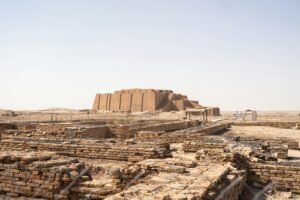Darius: When Pride begets foolishness.
Hiiiiiii people!!!!
After the weekly updates in June, the past few weeks without writing here have seemed really weird and still, even though the clock keeps on ticking. Time and tide, like they say, and sometimes I’m astounded by how quickly the time seems to be moving these days. I could swear I was a teenager last month, and now look at me. Nonetheless, we keep on keeping on. Moving from WordPress.com was a huge change, and sometimes I still don’t believe it, but here we are! Growing, and more importantly, learning to see the intentionality of God in His Word by the help of His Spirit.
Today, we’ll be discussing royalty. That has been a theme in my recent Bible study, and so it’s probably going to show up here more in the coming days. But this person was involved in one of the most popular Bible stories of all time, and yet, not a lot of people have ever thought about him, or can identify him by name. He was the first Mede to sit on the throne of Babylon after the quick dispatch of Belshaz’zar, the son of Nebuchadnez’zar, after he saw the hand writing on the wall (story for another day but I’ll gist you, I promise. In the meantime, its in the Bible o, you can check it out. Sweet story like this). Anyway, this person was a King over the nation that had captured and enslaved the Israelites, and at that time he had several of them who had been groomed by his predecessors, working under him. His name was Darius, and he was the king who threw Daniel into the lion’s den.
Did he mean to? Yes. Did he want to? No. And that’ something most people gloss over in their reading or telling of the story of Daniel in the lion’s den. But let’s not skip ahead. As always, we’ll begin at the beginning, in the book of Daniel, chapter 6. Daniel is found between the books of Ezekiel and Hosea, which might be a bit tough because some people might have never read through Ezekiel, or never even heard of Hosea at all (I’m guilty of one of the above). But it’s okay, that’s why we are here. To learn, to understand and grow in love and understanding of our Father. So let’s get into it.
I think Darius was a pretty wise king because his very first move when he got into office was to create a structure. Maybe it was because he became king at 62, so he was not a child, but there’s something so intentional about how he operated. So what he did was set a hundred and twenty prices over the entire kingdom, and then appointed three presidents for them to report to (Daniel 6:1-2). In just one move, he reduced his workload by delegating most of the rulership responsibility, and simultaneously made sure his people would be overseen and that those who were overseeing them would also be supervised. Talk about killing multiple birds with one stone, huh? He only had to deal with the presidents, or in difficult and unusual cases, the princes, and that was infinitely better than having to handle each citizen and their problem. This is why I think King Darius prioritised his mental health seriously, because who wants to deal with a full nation when they can only deal with three people? that is pure wisdom right there.
Now, of those three presidents, fine boy Daniel was one of them (Daniel 6:3). Mind you, Daniel had done all the things by then. Interpreted dreams for the great Nebuchadnez’zar and saved the lives of the great men and magicians, and he had even read the writing on the wall for Belshaz’zar and told him the meaning (again, hot gist but that’ll be later). He had been made the third ruler for this last one, but after Belshaz’zar was killed and Darius became king, he was reappointed as one of the presidents. So he was not a stranger to leadership, and the fact that the king not only appointed him at the start, but later planned to set him above even the other presidents and the entire kingdom (Vs 3), tells me that the King knew Daniel. Not just who he was and what he had done, but he knew him. So, how did they go from the king basically planning to make him deputy-king, to the very same king throwing him into Simba’s house? I’ll tell you how.
See, this Bible we all have but don’t read has stories that are better than many of the things we watch today. there’s everything inside, from hot thriller and suspense, like the one we’re discussing now, to action scenes (Just try I and II Kings first, you’ll come and testify), to even romance (Solomon is not anybody’s mate pleaseeee) and comedy (because you can’t convince me Gideon and Samson were serious people initially). Just try it, open your Bible and don’t just let your eyes wander over the words. See the Word, read it into being, and enter into worlds you thought only existed on screen. But back to King Darius and Daniel.
As is bound to happen, even if you’re just drinking water and minding your business, Daniel had people who did not like him. But unlike the normal existential bad belle people who just watch and judge, these ones were active. They went out of their way to plot his downfall and actually sought opportunities to discredit and report Daniel for not doing his job (Daniel 6:4). But as the worker par excellence that he literally was, Daniel was squeaky clean and dedicated to his work. They were so frustrated that they decided that the only way they were ever going to get Daniel into trouble was if the trouble had to do with his devotion to God. Ha! What a man! There are levels to aspire to in your devotional life, people you see and read about, and you just shake your head because you realise that you have not even started. You’re still learning. But again, that’s okay, as long as you stay the path and keep going.
So they planned their mischief, and guess who was the central piece in their plot? Yup, wise old King Darius. Because you see, inasmuch as the king had the wisdom of his years, he was still a man and was still prey to all of men’s faults, including pride. And these people knew it. After all, who better to know the king than those working directly with him? That’s right. Daniel’s enemies were his colleagues, the other presidents and the princes. That’s a whole message on its own, but all things in their own time. Let’s focus on the issue at hand. So, these people connived to trick the king into condemning Daniel by pandering to his pride. They went to him and convinced him to make a royal decree that basically commanded everybody to go to him, and only him, for their every need and petition for the next thirty days (Daniel 6:7-9). They were not to pray to any god or seek aid from any man, except the king, for whatever they needed during this period. If they did, they would be locked in with the cast of The Lion King. More than that, he was to seal it with his royal seal, according to their law, so that nothing and nobody could alter it. And he agreed, which does not make any sense to those of us on the outside looking into this story. But let’s drop our smug wisdom on how we can see that this is obviously a trick, and try to understand why he agreed.
This plan basically elevated Darius from the role of king to that of God, for the next thirty days. He would have the power to do and undo for his people, grant their every heart desire, and be the sole recipient of their gratitude, praises and most importantly, their worship. This edict seemed to grant King Darius the ultimate power over his subjects, the power of their belief. If he could control their needs and their faith, then he would have the power of life and death in his hands. And once people got used to having their needs met by their kings, whom they could see and touch, it would only be a matter of time before they forsook the gods they couldn’t. But in his hunger for this reality, in his foolish pride, King Darius forgot three very important things;
First, he forgot his purpose. He forgot that as king, he already commanded ultimate earthly power over his people. There was absolutely no need for the people to pray to him or seek his aid, because as their king, he was already obligated to meet their needs, as far as it was inn his power to. As king, it was his responsibility to do so, and requiring them to pray to him before he would was both unnecessary and redundant.
Second, King Darius forgot the essence of his structure. The entire point of appointing people and delegating his responsibilities in governing his people was to avoid and escape this exact scenario, where everybody needed him to solve their problems and give them what they wanted. That was why he had set the prices over the kingdom in the first place, and set the presidents over them to supervise. In signing this command into law, he rendered his entire governmental structure obsolete for the next thirty days.
Finally, and most importantly, Darius forgot that he was a man. In his haste to become El Shaddai to his people, he forgot that he was made, just as they were. He was given life, and so had no control over it. He was not a god, even though they were false and so had no power. And he definitely was not God, to command the worship of his people. He was man, and therefore was inherently unworthy of what he desired, but he desired it still.
And so he signed the edict into law, sealed by the law of the Medes and Persians, which could not be altered. You know the story from here. Daniel went ahead to pray to his God with his windows wide open towards Jerusalem, as he always had (Daniel 6:10). And when his enemies saw that, they flew to report to the King, demanding that he cast Daniel into the pit with the lions, like he had agreed to. The king tried and tried, from morning to evening, to save Daniel (who was still doing his thing, 3 times a day btw). But they reminded him that he had signed it into law, and that law could not be changed. he had said it himself, and so his hands were tied (Vs 12-15). Eventually, he had Daniel brought to him and prayed for him to be delivered, even as he had him thrown into the den of lions. the entrance was sealed with a stone, and with the seal of the king and his princes (Vs 16-17), and everybody returned to their abodes. But the king was deeply troubled. The folly of his decision now made clear to him, and he was so disturbed that he could neither eat nor sleep because in his pride, he had become a pawn in the destruction of an innocent man. But somehow, even in his despair, he had hope. Because very early the next day, King Darius woke up and went to the lions’ den to check on Daniel (Vs. 19&20)
What for? You could ask that, and it would be very valid. After all, he was the one who had thrown him in. Was he really expecting someone who had spent the nights with real-life lions to still be alive to answer? In today’s world, Darius’ actions would be seen as pointless and mentally unbalanced. But even though it made no sense, and he had no reason to, Darius had hope. And in that hope, he acknowledged both his limitations as a human being and his belief in the power of Daniel’s God to deliver him from death. In his “crazy” actions, we see Darius clinging to the chance that maybe, just maybe, Daniel’s God could truly do the impossible again. He must have heard the stories, but this time, he was believing for something that seemed unrealistic. And yet he believed. So when Daniel called out in answer, you can imagine the joy he must have felt. When Daniel walked out of that place without a scratch (Daniel 6:21-22), you don’t have to think far to imagine the look of wonder and awe he must have had. The sheer relief he must have felt that the hasty decision he had made to glorify himself had not cost this good man his life, simply because he believed in the true God. It was Daniel’s miracle, but it was King Darius’ salvation, an impact so strong that he made a decree that commanded everyone under his dominion to fear and worship the God of Daniel, proclaiming Him as the true God (Daniel 6:23-27).
Darius was a king who forgot the power of his crown and allowed himself to be lured by illusions, in a bid to sate his pride. You could think that this was an isolated situation, but you would be wrong. 1 John 2:16 warns us of the temptations in this world, such that all men fall victim to, telling us that,
“For all that is in the world, the lust of the flesh, and the lust of the eyes, and the pride of life, is not of the Father, but is of the world.”
In this case, Darius fell for the pride of life. But what do we fall for every day, in our own lives? Think about it for a moment, and you’ll see that every single thing you fall for is tied to one of these. But this Scripture clearly warns us that these are not of God. But like Darius, even when we fall, God in His mercy has given us the grace to return. He grants us mercy, trading our ashes for beauty by the power of His love and winning us from death to life by our Saviour’s blood. We have been saved, brethren, whether we know it or not. Christ has died for you, once and for all. Acknowledging this very expensive, yet free, gift from God leads us not only into newness of life and eternal salvation, but it also saves us from the hold of sin and the dictates of our flesh. Sin has no power over you. In fact, in a very ironic flip of the coin, you now have authority over it. You can choose to say no. You can choose not to go. You can choose not to do it, lie about it, or talk about it. You can, because of the power of God at work in you. Because of His Spirit, who dwells in you. You don’t have to live wrapped in the guilt and shame of your actions and inactions because your flesh no longer compels you. God does.
So as we live, let’s learn from the mistakes of Darius as well as from his redemption, and submit ourselves in humility to the Will of God for us, and His rulership over us. Ask the Holy Spirit to help you when you are weak, and even when you fall because you will fall, get up.
Remember, there’ll always be a home for you to return to, a Father for you to run to, and He’s waiting for you right there.
Calvary Greetings from My Heart to Yours,
Gabrielle…
Photo by Timo Wagner on Unsplash








6 thoughts on “The Trap of Hubris”
Steadily breaking down different parts of the Bible into very interesting stories for better understanding and comprehension.. thank you 😊
thank you for reading.
Just what I needed to read this Sunday.
thank you for being here.
I love the subject of mercy and humility to ask the Holy Spirit for help in our weaknesses for indeed it is subtle pride that prevents us from asking for His assistance.
We pride in our works
Our prayers
Our small small devotion and think we stand as a result of our own strength and are therefore hit with temptations that knock us off our feet.
the more we think we are, the less we actually are, and the more we need the Holy Spirit. Thank you for being here.